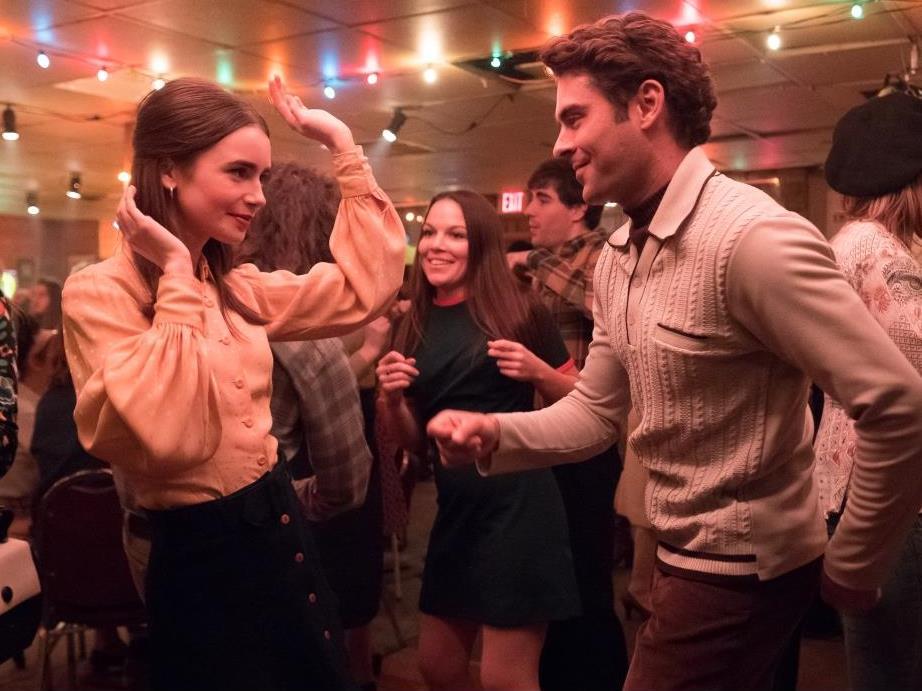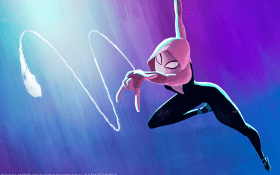Image: Lily Collins and Zac Efron in Extremely Wicked, Shockingly Evil and Vile. Source: Netflix.
The sight of young women falling for Zac Efron’s charms is nothing new, but it provides some of Extremely Wicked, Shockingly Evil and Vile’s most powerful images. Efron plays serial killer Ted Bundy, a man who earned the string of condemnation that gives the film its title, and whose spate of murders were aided by his looks and charisma. In the movie’s opening moments, single mother Elizabeth Kloepfer (Lily Collins) succumbs to Bundy’s visage over the jukebox at a bar, taking him home and becoming his long-term girlfriend. Later, when his former co-worker Carole Ann Boone (Kaya Scodelario) crosses his path after his first run-in with the law, she’s already besotted. By the time Bundy acts as his own legal counsel in his highly publicised Florida trial — America’s first televised proceedings — his heinous deeds are well known, but college-aged women still flock to the court. Asked the obvious question by reporters, they can’t explain their response.
It would’ve been easy to judge these love-struck ladies; usually, many do. With their feverish excitement over their idols, as well as their stereotypical screaming, shrieking guise, teenage girls and just-turned-adult women have long received scorn. Their tastes, devotion and reactions are either ignored or made fun of, even when they’re a weathervane, predicting the cultural prominence of icons like The Beatles and Elvis. Their passions are dismissed, with that purposefully wounding, historically loaded word — hysteria — too often bandied about. But, thankfully, mockery of these fans is absent in Extremely Wicked, Shockingly Evil and Vile. Seasoned true-crime filmmaker Joe Berlinger (the Paradise Lost trilogy) never dismisses or decries those in Bundy’s thrall. Instead, by casting Efron, he trades upon the High School Musical, Bad Neighbours and The Greatest Showman star’s appeal to unpack Bundy’s unnervingly prolonged spree. The murderer simply didn’t appear the part, whether cooking breakfast for Kloepfer and her daughter, chatting up co-eds or theatrically proclaiming his innocence for the cameras while trying to avoid the death penalty.
Looks can be deceiving, but it’s an ordinary-seeming man’s world, as Extremely Wicked, Shockingly Evil and Vile makes plain. Just why society is obsessed with all that glitters, even when it clearly isn’t gold, sits at the centre of the film. Why was it so easy for Bundy to evade detection as women kept going missing in similar circumstances? What kept Kloepfer by his side? When she finally left, what saw Boone eagerly take her place? Why did Florida law enforcement parade Bundy around like a prize when he was finally in custody? Why was he beamed into the country’s homes while on trial for such horrific crimes? In another of Berlinger’s smart moves, he doesn’t answer these questions. Just like Bundy’s motivations, he can’t offer a satisfying reason. What the director can do is explore how his subject operated, examine Bundy’s surrounding environment, and understand both how he was viewed by the masses, and by those who thought they knew him best. Berlinger also poses a straightforward truth: that the ability of a predator to blend in — and to lure victims in as if it’s the most natural thing in the world — can’t be underestimated.
Thirty years on from Bundy’s execution, the details of his background, killings and court antics have been exhaustively chronicled, including in Berlinger’s own Conversations with a Killer: The Ted Bundy Tapes, a four-part documentary series that released on Netflix in January. Extremely Wicked, Shockingly Evil and Vile draws its true tale from Kloepfer’s memoir, The Phantom Prince: My Life with Ted Bundy, taking not only the book’s story and timeline — from their first meeting to their last on death row — but also its perspective. While Berlinger and screenwriter Michael Werwie split their focus between Kloepfer and Bundy, jumping from her account to his actions, the film peers at the killer from the outside, rather than getting in his head. Bundy may have been flattered by their approach, the casting of Efron and the movie’s meticulous courtroom recreations, but that’s not the intention; as he demonstrated in a chilling and calculated manner, perception can be used as a weapon.
Efron, beyond his visible fit for the part, assists the film immensely. To dissect Bundy’s unsettling allure, and how it deflected attention from the cruelty lingering underneath, is to replicate it, which the star does in one of his best performances. Glimmers of maliciousness frequently remain just that, changing a gaze or expression ever so slightly and momentarily — never glorifying Bundy or downplaying his atrocities (which are largely committed off-screen), but showing him as he was seen. Collins and Scodelario convey the flip side, as women caught by his charm and grappling in their respective ways. Among the many personifications of justice, John Malkovich sinks his teeth into the role of Judge Cowart, who proves both no-nonsense and surprisingly sympathetic.
Still, perhaps aptly for a feature about Bundy, Berlinger’s movie is an uneasy experience — though not for the obvious reasons. Pondering Bundy’s facade results in a film with a compelling angle, important questions and a crucial awareness of how difficult its lines of inquiry are to resolve. Here, however, it also results in a film that is often guilty of sticking to the surface. Extremely Wicked, Shockingly Evil and Vile sees Bundy, eschewing birth-to-death crime biopic conventions and police procedural tropes to stare at his carefully cultivated persona, but it also pairs its view with storytelling clichés (warmly shot, home video-style montages of domestic bliss and exposition via news reports, for example) that couldn’t be more routine. There’s a message there, once again mirroring how evil can lurk in plain sight; sometimes, alas, that’s all that that the film reflects.
|
3 stars
|
★★★
|
Extremely Wicked, Shockingly Evil and Vile
Director: Joe Berlinger
US, 2019, 110 mins
Actors:
Director:
Format:
Country:
Release:





